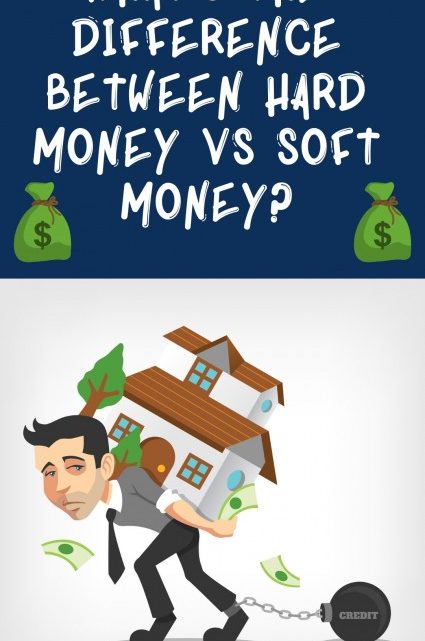What’s The Difference Between a Hard Money and Soft Money Loan?
Getting rich overnight, or even in our sleep is something everyone dreams of. Time and time again, more people are looking to find the one-stop shop to turn this dream into a reality.
For these dreamers, most millionaires point to this industry as a cash cow. Real Estate Investing, whether buying homes or renting is how more people are making millions.
House flipping and real estate investing are at an all-time high, and it’s no wonder why! Thanks to the popularity of different house flipping shows, more people than ever are looking to becoming real estate investors themselves.
For first time investors, learning the ins and outs of the industry is a must, and many just don’t know how to get started. For many investors, loans are typical, but finding the perfect loan for your investment can be tricky.
Real Estate investors looking to find the difference between hard money vs. soft money can quickly get overloaded with too much information. Knowing the main differences is vital for investors looking at hard money vs. soft money because it can not only save a deal from not funding but find the right funding for their investments.
Selling your investment is an art form, but knowing which loans for your investment, should be rocket science. We break down the three key differences between hard money vs. soft money below!
 Credit
Credit
A significant difference between hard money vs. soft money is how the loans are secured. In Most traditional loans and mortgages, also known as soft money, the loan is secured by the lender’s credit, income, and other factors.
Hard money differentiates itself by being secured by the after repair value of the real estate investment.
“After repair value or ARV refers to the future value of a property, after the repairs are made. It combines the current property value, with the market value of repairs, and hard money lenders use this value to determine the amount of the hard money loan,” says Loren Howard, of Prime Plus Mortgages – Maricopa Hard Money Loans
Another difference between Hard money vs. soft money is how quickly a deal can fund. Credit and background checks can take a long time, sometimes even weeks to complete!
Hard Money is much faster to approve because it is secured with real estate, instead of lengthy credit checks. Hard money loans can actually fund within a few days of approval! Ideal for fast-moving real estate deals.
For those with less than perfect credit, or without their personal assets to tie to loan, often find that hard money loans can be a fast way to secure a real estate investment with little risk.
For first time investors looking for the best rates, there is a big difference with hard money vs. soft money.
Rates
Value Penguin states that with a Loan to Value Rate of 80% with a 20% down payment, has an average rate of 4.39%, with actual offered rates ranging from 3.50% to 7.84%.
This is a vast difference from the Hard Money Lending Rate of 7% to 15% that is standard with most hard money loans.
A key difference from hard money vs. soft money loans is the rates, because of how the loans are secured and the term lengths. Loans secured by real estate and secured by after repair value will have higher rates than their traditional counterparts.
“Why Are Hard Money Loan Rates SO HIGH?” You may be asking.
Simply put, hard money lenders take a more substantial risk when securing your loan. With higher risks to the lender, they have to have higher rates to make sure they get their return on interest. In order to offer the short term and ARV based loans, and not base their loans in credit and personal assets, they require shorter terms, and higher rates to negate the risks of lending to otherwise risky investments.
The actual rates and terms of your loan will be at the discretion of your lender, but with a higher down payment, you will see significant changes in rates and points.
The last key difference between hard money vs. soft money loans is the length of the loan term.
Terms/ Length of the Loan
While choosing the length of your mortgage may be easy with a soft money loan, hard money vs. soft money term rates could not be further apart when it comes to term lengths.
Your standard mortgages term length is 30 years, which based on the property value, and smaller interest rate makes sense for how one would traditionally use this mortgage For an owner-occupied residence, to live and not conduct business.
That’s why tying personal assets, credit scores, and employment history works for most people looking for a traditional mortgage.
For first time investors, and house flippers, having a short term loan is ideal for a property that you only intend to flip in a few months.
Hard money loans terms average between 6-24 months. Ideal for house flippers looking to purchase a property as is, make repairs and sell it for a profit in the fastest time possible.
Hard money loans are designed to be for short term loans for the purpose of purchasing, improving, and then selling or renting properties. Hard money loans loan terms tend to be anywhere between 6 months to 2 years at the longest.
Depending on the investment, and the loan, this gives investors time to purchase, improve, and pay off the loan relatively quickly, and to start profiting from the investment faster. Depending on the kind of loan you have, you could possibly extend the mortgage, but most investors find it easy to work within this time frame.
Summary:
Deciding on whether hard money or soft money loan is ideal for house flipping can be tricky. With significant differences in how a loan is secured, the terms and rates, choosing the best mortgage can be broken down like this.
We can see that for real estate investors looking for a fast loan, without tying their personal assets for a shorter amount of time, with less hassle, hard money is a clear winner.
However, for those looking for a long term property with the most extended terms, and lowest rates, a soft money loan would be better for their investment needs.
- Credit: Soft Money, uses personal credit scores, assets, and more to determine your rates and ability to take out a loan. Hard Money secured the loan using the after repair value, making it fast to fund and reduces risk to the investor.
- Rates: Hard money loans offer shorter terms, and take a more considerable risk to the lender, leading to higher rates than soft money counterparts.
- Loan Terms: Soft money tends to loan out to 30years, like traditional mortgages, while hard money loans are better suited for a short term investment like a flip.
Have You Ever Used A Hard Money Loan?
Additional Helpful Real Estate Articles
- Frequently asked mortgage questions – see some important questions you should ask the lender when you are procuring financing to purchase a home. The answers to these questions will help determine who should be used for your mortgage. It is also beneficial to have a strong grasp on important financing questions.
 About the author: The above article on the difference between hard money and soft money was written by Catherine Way. Catherine graduated from Michigan State University with her Bachelor’s of Advertising with a specialization in Graphic Design.
About the author: The above article on the difference between hard money and soft money was written by Catherine Way. Catherine graduated from Michigan State University with her Bachelor’s of Advertising with a specialization in Graphic Design.
She works as a freelance content creator for many facets of real estate, including commercial, residential, and mortgage industries. She spends her free time finding new ways to talk to people, through writing, designing, dancing, and more.













No Comment